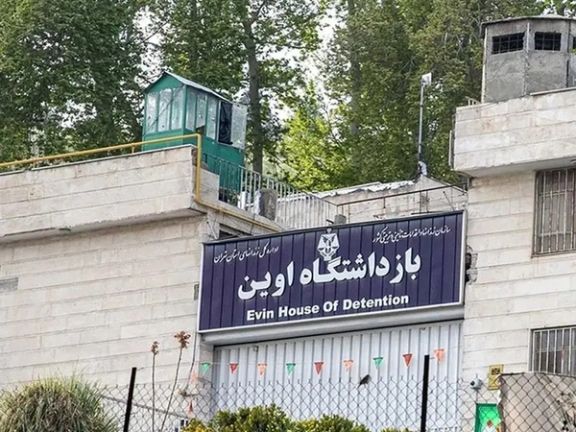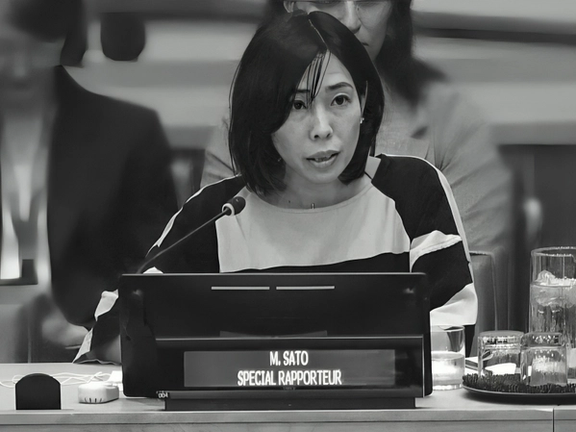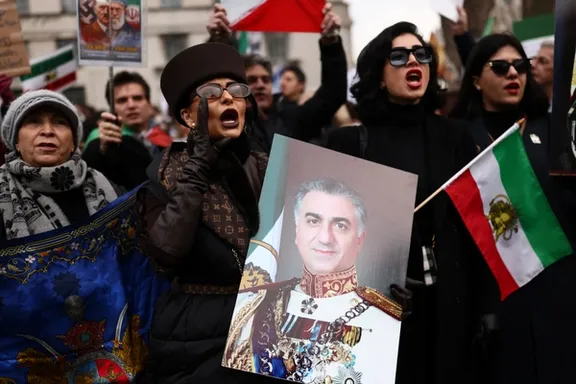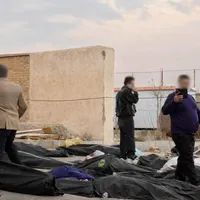The report by Mai Sato, dated August 26 and presented to the UN General Assembly on Thursday, covered developments from January to July 2025.
It described a “deeply troubling deterioration” in human rights, citing arbitrary detention, torture, discrimination and other forms of state violence.
Israeli attacks 'violated key principles' of international law
The report said Israeli and US attacks between June 13 and 24 on Iran’s military, nuclear and civilian infrastructure—including Evin Prison in Tehran—killed about 1,100 people, including 102 women and 45 children, and injured more than 5,600.
The report added that non-state sources estimated between 40% and 60% of those killed were civilians.
"Israel attacked over 210 commercial centers, 16 educational centers, 17 energy installations, nearly 10,000 residential units and 23 medical facilities, including hospitals in Kermanshah and Tehran," the report asserted.
"Core tenets of international humanitarian law appear to have been violated, namely, the need to distinguish between combatants and non-combatants, ensure the proportionality of military actions and minimize foreseeable harm to civilians and civilian infrastructure," Sato wrote.
Israeli assassinations of 14 nuclear scientists she described as "unlawful killing."
Attacks by Israel and the United States which both powers lauded as key setbacks for their Mideast adversary and a boon to international security she condemned.
"The Special Rapporteur underscores that armed attacks on nuclear facilities must never occur, as they could release radioactive material with catastrophic humanitarian and ecological impacts."
The attacks prompted Iran’s parliament to suspend cooperation with the International Atomic Energy Agency (IAEA) and introduce laws expanding espionage offences and limiting the work of journalists and civil groups.
'Alarming' rise in Iran executions
Sato said Iran’s use of the death penalty reached “alarming” levels, averaging three to four executions a day.
More than 700 people were executed during the reporting period, including at least 98 Baloch, 42 Kurds, and 8 Arabs, along with a rise in executions of Afghan nationals.
Half of the executions were for drug-related offences, followed by homicide and “security-related” charges, including espionage for Israel.
Sato said executions were carried out amid “procedural violations” and that the authorities had made public only 8% of the total cases, leaving most unacknowledged.
Torture, amputations and prison abuse
The report detailed accounts of torture, sexual violence and the denial of medical care in detention. It cited the amputation of four fingers each from three men convicted on theft charges — Hadi Rostami, Mehdi Sharafian and Mehdi Shahivand — at Urmia Central Prison in July as “state-sanctioned mutilation.”
Following Israeli strikes on Evin prison on June 23, which killed about 80 people, prisoners were transferred to overcrowded and unsanitary facilities, the report said, adding that the whereabouts of several detainees remained unknown.
Crackdown on media and activists
Sato said authorities had detained over 21,000 people during the June escalation, amid what she described as a “massive clampdown on civic space.”
The judiciary also sent text warnings threatening prosecution for citizens who engaged with what it called “Zionist regime pages” on social media.
The report said journalists working for Iran International and BBC Persian continued to face death threats and harassment of their families inside Iran.
Kurdish rights group Hengaw Organization for Human Rights, the report added, was repeatedly targeted with "smear campaigns, threats, false legal accusations, attempted abduction and death threats".
Minorities and deportations
The report highlighted systemic discrimination against the Baha’i, Kurdish, Baluch, and Arab ethnic minorities as well as Afghan refugees, including arbitrary arrests and the mass deportation of over 1.5 million Afghans during the first half of the year.
It said the revival of the mandatory hijab enforcement law and new surveillance powers further restricted freedoms, while lawyers, activists and women’s rights defenders faced imprisonment and unfair trials.
Lethal violence beyond war
Sato said Iran’s human rights violations go far beyond the June conflict, forming what she described as a years-old “broader pattern of lethal violence”.
She cited as evidence extrajudicial killings along Iran’s borders, deaths in custody, a culture of impunity for state violence and laws that permit gender-based abuse.
“Violations of the right to life are manifested in multiple forms,” the report said, adding that between 11 and 17 Kurdish border couriers, known as Kulbars, were killed and up to 22 injured during the reporting period.
At least 71 fuel porters or sukhtbars were also killed and 54 wounded in Sistan and Baluchestan Province in Iran's Southeast. Landmine explosions killed continued to take lives among both vulnerable border communities, it added.
'No relief'
Sato urged Iran to repeal laws criminalizing peaceful expression, end the use of torture and forced confessions, and investigate deaths in custody and border killings.
Foreign governments, she said, must protect Iranian exiles, human rights defenders and journalists from cross-border harassment and support civil society groups documenting abuses.
“Post-conflict periods present critical opportunities for national unity and healing,” Sato said. “Yet in the Islamic Republic of Iran, the end of fighting has not brought relief for the people.”














